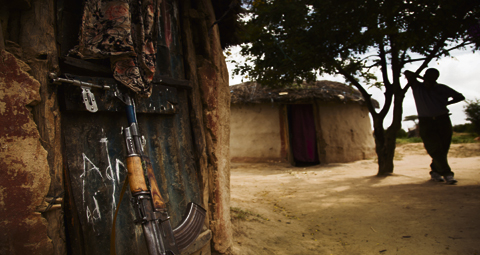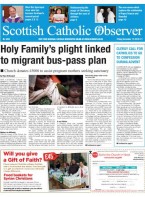BY Ian Dunn | February 5 | ![]() 0 COMMENTS
0 COMMENTS ![]() print
print

Their very lives are in our hands
In Ethiopia and some surrounding African countries, the success or failure of conflict resolution hold the lives and future of men, women and children in its hands. IAN DUNN reports from his visit to the region with SCIAF
Gordo Abduba waited by the long, red road for her husband to return. She was 23-years-old, a baby daughter at her breast, a toddler son tugging at her leg.
She waited for hours.
Her family was fleeing house burnings and shootings, an explosion of ethnic violence that made them run for their lives. Fearing the worst, they ran for the border with Ethiopia yet, after only an hour on the road, her husband panicked.
“He remembered he had left the front door unlocked,” she said. “He felt he had to go back and lock it.”
Hours later, after dark, he had not returned. Neighbours found her on the road.
“We found him,” they told her. “He is dead and your house is burned down.”
She wept.
“I looked at my children,” she said. “I thought ‘I cannot save you, I cannot provide for you.’ Suicide was my only option.”
Gordo, from Kenya, fled violence after the 2012 elections in her country, and she found safe haven in Ethiopia. Truthfully she could have been from Syria, Nigeria, Yemen or any number of places where recent violence has ripped communities apart, and mothers have ran for their lives, clutching their children.
The worst of the violence in Gordo’s region was between two groups of pastoralists, the Gabra and the Borena, who are spread across Northern Kenya and Southern Ethiopia. To the outsider their cultures seem almost identical, both dependent on the herding and keeping of Cattle and other animals, as their ancestors have done for hundreds of years. There is just enough difference, enough separation, however, for demagogues to whip up fear and violence between them. Life has always been hard in East Africa, but now the droughts are harder and the rains come less often. In desperation people turn on each other.
When Gordo, a Borena, fled across the border to Ethiopia, the Borena there gave her a place to live.
CIFA, a local organisation supported by the Scottish Catholic International Aid Fund (SCIAF) gave her food, blankets. She survived. Her children survived.
“I won’t tell my children this story,” she told me, grief on her like a muzzle. “They will want to take vengeance for me, for their father, and they may die. All they have is me and God. I just want them to get an education, have a better life.”
On the other side of that conflict was Bagaja Guyyo, a Gabra. He was also from Northern Kenya. Around 70, he walks with a cane, though is still spritely. When he boasts of his 21 grandchildren, he grins yet behind his striking dyed orange beard, the smile does not reach his eyes.
“We burned the Borena in their houses,” he told me. “We took one stick of a safety match, and lit their houses on fire whether there was mother, baby or cow inside. We had no mercy.”
When tensions erupted around the Kenya election, he said, his brother was shot by the Borena.
“I wanted vengeance,” he explained, and so he urged his sons to take action, to attack the Borena, to burn down their houses, as he cheered them on.
Now he struggles to explain it.
“We were very emotional,” he said, looking pained. “During the election, we were afraid, the Borena were afraid. We though if the Borena won, they would take land away from us. They thought the same about us. We Gabra are a shy people, we were afraid the Borena would exploit that.”
Hundreds were killed in that violence, thousands more fled.
“I am full of sorrow,” he told me. “I pray to God about it. They killed my brother… I was so angry.”
The consequences of this kind of violence are terrible, but the causes are familiar. The fear that dominates, we are told, is that someone else will come and hurt you and your family, take what you have. Many know the same fears in Europe, when they see refuges streaming across borders but fear is greater when you have less to lose.
“The climate changes, it makes things worse,” Bagaja told me. “The wells dry up, people lose their cattle. The man who loses his cattle, he looks to steal mine. It is the same on all sides.”
After the violence worsened in Kenya, he and his family also fled to Ethiopia. They also received help through SCIAF’s partner, CIFA.
“Without blankets to warm us and food to swallow, my family would have died,” he said.
While he says relations have improved between the Borena and the Gabra, the future remains uncertain.
“Now we are at peace,” he said. “I don’t know what will happen tomorrow. For me, I am old. If I die, I die. But I worry about my children.”
Across East Africa, temperatures are rising. A new drought threatens 20 million people in Ethiopia. They will need food assistance or face starvation. As hunger blights, violence blossoms. In the past three months, reports suggest that dozens have died in clashes between the government and protestors.
One man trying to resist violence is Nura Dida, 58. Clearly successful, and respected by the people here, he is the chairman of the Oromo Pastoral Association, a group supported by SCIAF. His association tries to support the pastoralist lifestyle of the Borena, Gabra and other peoples who continue their life style of herding cattle across the Palins and grasslands of Eastern Africa. Historically they have struggled for acknowledgment and respect.
“I’ve fought for recognition for pastoralists all my life,” he told me. “I’ve seen friends killed, but now is a time of great challenge. The rains fail, the wells dry up, cattle die. People become desperate, and that sparks conflict between communities. Climate change is a massive factor driving conflict here.”
He is a Borena and told me that, as a young man, he ‘always took the side of the Borena, against the Gabra, anyone.’
“But I regret it,” he added. “One hand cannot wash itself. All pastoralists, whatever group they come from, must work together.”
To that end his association has brought together leaders from the three main ethnic groups in the region to sit on a joint committee.
“We give each member a mobile phone,” he said. “Whenever there is a problem, when cattle are stolen, when there is a fight, we say ‘call each other.’ This is how we build peace. These respected people, they talk to each other, they talk to their own. They defuse the situation.”
Even in a world of war and refugees and houses with babies being burned alive inside, one phone call can be enough to keep or reinstate peace.
This Lent SCIAF’s Wee Box Campaign, with DFID aid match, is helping the pastoralists of Southern Ethiopia. It is helping them cope and adapt their ancient way of life to a warming way of life. It is saving the victims of violence and encouraging people who make peace.
Ethiopia has always been hot, has always been hard, but the situation is getting worse, according to experts. The world is warming, and forcing millions towards hunger and conflict. A dark road, but where they lead, evidence suggests the world will follow. Helping them find solutions that save thousands today, may save millions tomorrow.
- — SCIAF’s WEE BOX: £1 = £2 For every £1 you give to SCIAF’s Wee Box Lent appeal between February 5 and May 4, the UK government will give £1 too. This money will help poor cattle herders in Ethiopia who are being hit by climate change, and people in need around the world, to have a brighter future. To find out more and get your own Wee Box, please visit www.theweebox.org, call 0141 354 5555 or email: [email protected]
Pic: Simon Murphy










